

A Food Waste Movie. The Future of Doodling. A doodle is a wandering thought, uninhibited and untidy.
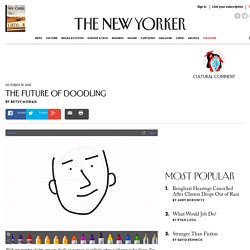
It’s not going to be hung in a museum. Doodlers have various tendencies and preferences and motivations, but all doodlers know the marvellous, mind-dusting reverie of doodling, which also happens to offer a respite from other trending modes of content creation. If posting is like paddling, doodling is floating out into the water. “I would prescribe it like a vitamin,” Sunni Brown, a professional doodle evangelist from Austin, Texas, told me.
Brown published a book called “The Doodle Revolution,” hit the TED Talk circuit, and now runs a business that coaches companies in “Performance Infodoodling”—a three-hour webinar costs a hundred and twenty-one dollars—among other doodlely things. But those accustomed to doodling on scrap paper know this: the bliss ends the moment you stop, study the result, and decide to trash it. Storytelling: 8 ténicas de narración a tu disposiciónApptúa. Del storytelling hemos hablado en repetidas ocasiones.
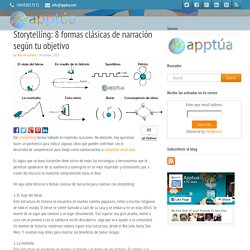
M.fastcompany. If you procrastinate (and most of us do), you’re in good company.
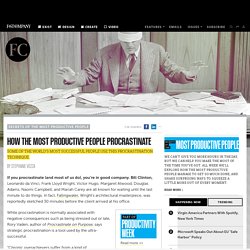
Bill Clinton, Leonardo da Vinci, Frank Lloyd Wright, Victor Hugo, Margaret Atwood, Douglas Adams, Naomi Campbell, and Mariah Carey are all known for waiting until the last minute to do things. In fact, Fallingwater, Wright’s architectural masterpiece, was reportedly sketched 30 minutes before the client arrived at his office. While procrastination is normally associated with negative consequences such as being stressed out or late, Rory Vaden, author of Procrastinate on Purpose, says strategic procrastination is a tool used by the ultra-successful.
"Chronic overachievers suffer from a kind of procrastination called priority dilution," says Vaden. "They became successful by being a massive taskmaster, but as they move up and have more responsibility, their priorities become diluted. Procrastinating on purpose, however, allows ultra-performers to solve the priority dilution problem. Can I eliminate it? M.fastcompany. Editor’s Note: This article is one of the top 10 Leadership stories of 2015.
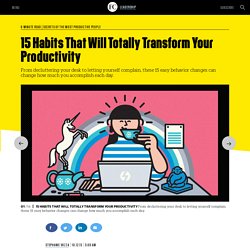
See the full list here. People who manage to get a lot accomplished each day aren't superhuman; they've just mastered a few simple habits. Some may be easy to guess: Keep your desk organized and aim for around eight hours of sleep a night. But others, like taking a mid-day nap or complaining, might surprise you. Here are 15 easy ways to make every day more productive: 1. Messy work space: Creativity may arise from chaos, but a litter-strewn office probably isn’t helping you get stuff done. Tidy workspace: People with neat offices are more persistent and less frustrated and weary, according to a recent study in Harvard Business Review, which found that a clean desk helps you stick with a task more than one and a half times longer. 2. No matter how crazy your days get, make sure you carve out and ruthlessly protect just 90 minutes—20% of an eight-hour day—for the most important tasks.
The Power Of I Don't Know. The Power Of I Don’t Know by Terry Heick At TeachThought, nothing interests us more than students, as human beings.
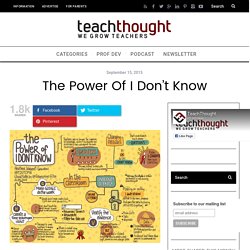
What they know, might know, should know, and do with what they know. A driving strategy that serves students–whether pursuing self-knowledge or academic content–is questioning. Questioning is useful as an assessment strategy, catalyst for inquiry, or “getting unstuck” tool. Questions are more important than the answers they seem designed to elicit. It’s okay to say “I don’t know.” Rebeca Zuniga was inspired to create the above visual by the wonderful Heather Wolpert-Gawron (from the equally wonderful edutopia, and also her own site, tweenteacher). The implication of a question is that the student should have (some kind of answer). The value (of an answer) was granted by the teacher. I don’t know, then, isn’t just a starting point for finding an answer, or a ready-made template for some academic essential question.
Student: A democracy? Teacher: Why? Student: Because of.